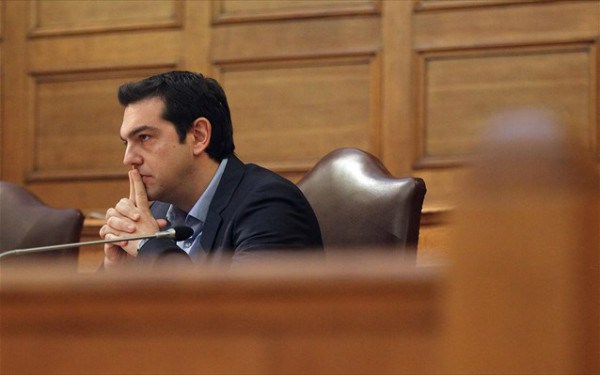Paul Tugwell & Marcus Bensasson, Bloomberg
Greek Prime Minister Alexis Tsipras, facing euro-area demands for a credible economic plan, is fending off allies at home who are spoiling for a fight.
With the 41-year-old premier due to address parliament in Athens Monday evening amid a deepening cash crunch, a pair of his ministers warned against retreating from election promises to end austerity.
Tsipras’s Syriza party was elected Jan. 25 on a platform of easing budget cuts and restructuring debt. While he backed away from those positions to win a Feb. 20 agreement to extend the nation’s bailout until the end of June, Tsipras’s diplomatic maneuvering and the delays in providing a detailed economic plan are frustrating the rest of the currency bloc.
“The Greek government’s strategy of isolating Germany and getting a majority of other euro-zone members to support another package against vague promises and no coherent reform plan has failed spectacularly,” Erik Nielsen, global chief economist at UniCredit Bank AG, said in a note on Sunday. “If the Greek government does not make the necessary U-turn, they’ll run out of money.”
The Athens Stock Exchange index fell 0.9 percent at 1:34 p.m. in Athens on Monday. The yield on three-year Greek government bonds rose 58 basis points to 21.2 percent.
Greece has red lines and won’t agree to any “recessionary measures” such as cutting wages or pensions or allowing mass dismissals, Tsipras told Real News newspaper in an interview published Sunday. He’ll speak to parliament in a debate session scheduled to begin at 8 p.m.
The only way for Greece to end its crisis is through confrontation, if not conflict, with a “Germanized Europe,” Energy Minister Panagiotis Lafazanis said in an interview with the Athens-based Kefalaio newspaper. Privatizations, especially in strategic areas, “can’t and won’t happen,” he said.
‘Bad Scenario’
Euclid Tsakalotos, international economic-affairs minister, said Greece won’t abandon its anti-austerity philosophy in return for aid, according to an interview with the U.K.’s Guardian newspaper. Greece wants an agreement but will go its own way “in the event of a bad scenario,” he said.
Negotiations with Greece’s creditors are continuing and the government is presenting a program that would allow a primary budget surplus of 1.5 percent of its 2015 economic output, Finance Minister Yanis Varoufakis said in an interview also published Sunday in the Athens-based To Vima newspaper.
The proposed reforms will bring in an extra 3 billion euros ($3.3 billion) of revenue this year and enable the economy to grow 1.4 percent in 2015, a Greek government official who asked not to be identified in line with policy, said on Sunday. Creditors agreed to extend Greece’s bailout program until June in return for commitments such as streamlining sales-tax rates and eliminating loopholes allowing early retirement for some employees.
The revenue measures include a crackdown on tax evasion, an auction of broadcasting licenses and sales of state assets under certain conditions.
“After capital flight of 50 billion euros within three months, it is difficult to see how Greece could muster any growth at all this year,” Holger Schmieding, chief economist at London-based Berenberg Bank, said in an e-mail. “And after the plunge in tax revenues in January and February, Greece is on track for a primary deficit, not a surplus,” he added.
Talks between Greek officials and the so-called Brussels Group, which started March 28 and continued on Sunday, were cooperative, detailed and meaningful, a Greek government official said on condition of anonymity as the discussions are private. Both sides agreed in principle that policies should shift the burden from lower-income groups to higher earners while details of the reforms will be discussed with inspectors in Athens, the official said.
Fitch Ratings lowered Greece’s credit rating on March 27 by two levels to CCC, or seven levels below investment grade, citing the country’s liquidity constraints and difficulties in reaching a financing deal with its creditors.
“Lack of market access, uncertain prospects of timely disbursement from official institutions and tight liquidity conditions in the domestic banking sector have put extreme pressure on Greek government funding,” Fitch analysts led by Douglas Renwick said.



















